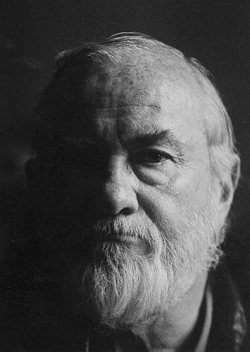High Wire

[Photo by Robert Birnbaum] I was a reader of Robert Stone (A Hall of Mirrors, Dog Soldiers, A Flag for Sunrise, Children of Light, as well as assorted entries in Harper’s—one on Havana and one on the 1988 Republican National Convention in New Orleans) before I knew anything about him. My biographical enlightenment came about with the publication of his fifth novel, Outerbridge Reach, in 1992. I arranged to converse with Stone as he toured the country to tout his latest novel. Coincidentally, The New York Times Magazine published a profile of him around the same time; of course, I found his personal story as compelling as those he wrote. I since have had the opportunity to chat with Robert Stone a number of times, most recently when he published Bay of Souls in 2003. I am aware that last year he published a reminiscence, Prime Green: Remembering the Sixties, and most recently a short story, “High Wire” in Thomas Beller and Joanna Yas’s Open City.
Since I view Robert Stone as one America’s (both hemispheres) greatest living writers, the appearance of anything with his byline warrants serious attention—dare I say, it’s an important publishing event? His new story features Stone’s hallmark of people in trouble sinking deeper in their travails. The narrator is a journeyman writer (Tom) who frequently finds work in Hollywood and its global suburbs. He attends a movie premiere “At Grauman’s about midway between the death of Elvis Presley [1977] and the rise of Bill Clinton [1988?]” Stone’s chiaroscuric vision is exhibited early: “The camera flashes and demented fans crowding the velvet rope were all memories. Hollywood Boulevard was even rattier than it is now. The only people around the marquee that night were frightened looking Japanese tourists and bright-eyed street freaks with slack smiles.” Tom sees Lucy: “My first impulse was to leave her alone in her distress. I was certainly not impelled to a hypocritical display of concern. But it was one of those bells; I was unattached, still single, due to leave town in a week. Maybe I’d had a drink or smoked a joint before the appalling show. Anyway, I moved one seat toward her.”
Lest these remarks devolve into the degraded form known as a review, let me conclude by observing that we have a sense that Lucy, a moderately talented actress from California and of Armenian extraction, is doomed. Some of the story’s tension stems from whether her sometime lover and admirer also falls to bad fortune. And so it is with Mr. Stone’s fiction. And always well worth the effort.
